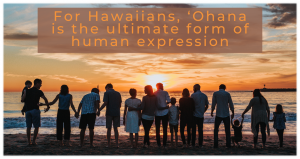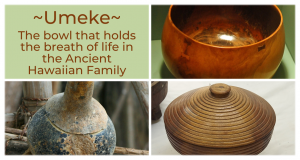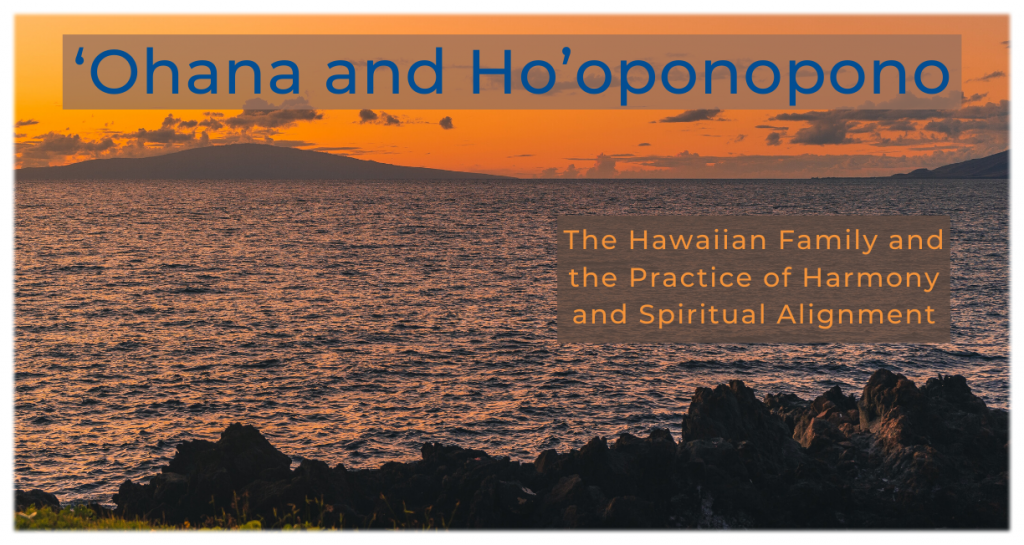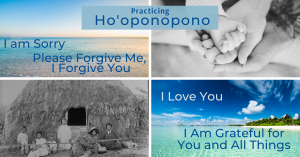In Ancient Hawai’i, nothing happened without the acknowledgment of the Gods and Goddesses.
There was no word for religion in the Hawaiian language. Back then, religion was a philosophy of everyday life in its entirety. Hawaiians knew they were more than physical beings and always focused on being in touch with their creator.
Hawaiian Cosmology – We Live in a Spiritual Universe Governed by Spiritual Laws
Everything the Ancient Hawaiians Did, They Did with Prayer.
Therefore, they quickly understood that they must live in harmony with nature for survival. Live according to a standard that would support unity. ‘Ohana* and Ho’oponopono* are not just ancient spiritual ideas. These are a discipline for survival. Hawaiians prayed or often chanted throughout the day as if they were having a conversation with their authentic gods with whom they shared their world.
(In our commitment to honor tradition and authenticity, you can find a glossary of our Hawaiian words at the bottom of this blog.)
Healing and medicine were also based on harmony and spirituality.
Traditionally, illness was thought to be the result of an imbalance in the three primary forces of lōkahi* (God, Nature, Humans). They asked the question, What has happened in life to upset the balance? (of this person, this crop, or this life experience).
The understanding of lōkahi prompted Hawaiians to honor and respect all things and conduct their daily life by aligning with nature. This tradition was passed on by the kūpuna* through practice and deep insight, history, and story-telling.
The Hawaiians had excellent skills as healers, which stemmed from their reverence for life. They believed that the pathway to health was, first to heal mentally and spiritually. Ho’oponopono was used to achieve this.
‘Ohana – The Hawaiian Family
Hawaiians, like most cultures, actively cherish their family. ‘Ohana is not just blood relations. They believe that all Hawaiians are family. It encompasses all who share a natural sense of aloha. But when someone says the word ‘Ohana today, it usually refers to all relations, no matter how distant, and also close friends, someone you trust deeply.
Hawaiians are defined by their relationships with each other, their ancestors, and their land.
They would feel incomplete without being connected to these bonds. To Hawaiians, ‘Ohana is the ultimate form of human expression. Humans do what they do best – caring, teaching, inspiring, encouraging, and disciplining. Whatever it takes to build a stable, beautifully functional society.
‘Ohana can be defined as a group of both closely and distantly related people who share things like land, food, children, and status. For Hawaiians, these ties need continual cultivation and nurturing.

In Hawaiian society, one is expected to know and understand what it means to be a contributing member of the family and community. Everyone has a responsibility to use their talents to benefit the entire ‘ohana and contribute to the tasks of daily life.
Hawaiian Values* must always be in play.
In other words, by fulfilling their duties to the ‘ohana and recognizing the capabilities of others, the family bonds deepened, and the family members increased their mana*.
‘Ohana built on this foundation ensured the health of the community as a whole.
Even in death, as loved ones pass on, they would continue to fulfill their familial agreements from the next realm. Generation upon generation of lineage is composed of a long and precise chant, which is recited and committed to memory. In this way, ‘Ohana members were declaring their love and connection to their ancestors and acknowledging their mana.
To enhance this idea, here is an ‘Ōlelo No’eau*
(Hawaiian Proverb)
I ulu no ka lālā i ke kumu.
The branches grow because of the trunk
Without our ancestors we would not be here.
Another exceptional practice in Hawaiian culture in the days past is that their doors were always open to greet, feed, talk story* or sit silently with a stranger. When a young girl asked her tutu* why she fed a malahini* that passed by, her tutu replied, No one is a stranger. I was not feeding the man, I was greeting the spirit of God within him.
The practice of honoring others was such a large part of the Hawaiian culture that it needed no name. Today we call it the Aloha Spirit, but to the Hawaiians of old, it was natural and instinctive.
What was natural and instinctive for them may now seem irresponsible and naive to people nowadays.
Therefore, when you learn some of their ancient practices, you must remember that their society was utterly opposite to ours. There was no money, no land ownership, and everything was shared with the village and the Ali’i*. Owning land completely mystified the Hawaiians when it was introduced by the incoming Westerners.
Also, they had no need for money, and they were given land by the Chief and Ali’i for their needs. Yes, it was an all-together, radically different world, not perfect, but still, very different from ours. It was a time, a place, and a people, where concepts like ‘Ohana were an ideal, perfect fit!
Ho’oponopono – Harmony and Spiritual Alignment – Putting Things Right
In Hawaiian households of old and of today, you will often see a vessel, sometimes a bowl, or a gourd, called an umeke* sitting in a predominant area of the home. The umeke will most likely have a lid. When the cover is on, all is well and harmonious. If you see the cover taken off, someone in the family has let it be known – all is not well. Someone has announced the need for the family to come together; to recreate harmony and spiritual alignment.
Also, the cover of the umeke was also crucial because of the belief that the bowl held the Ha*, the breath of life. Once the cover was removed, signifying discord in the home, it also meant that the Ha was disappearing from the umeke. And without the breath of life, life will slowly disappear from the family in the same way life will disappear from any living being.
Ho’oponopono – An Ancient Tradition
In order to restore harmony in the home, the sacred and traditional ceremony of Ho’oponopono was practiced. This practice is understood by everyone, that each person is telling their story from their unique perspective. Each person has their own truth. No one person’s viewpoint is the whole truth.

The practice of ho’oponopono is rooted in 4 simple yet complex actions:
- Apologize – I am sorry
- Forgiveness – in thought, word, and deed – Please forgive me, I forgive you.
- Love – share your love for each other – I love you.
- Gratitude – for all things – I am grateful for you and all of life.
If we want to learn forgiveness, it seems we can learn a lot from the people of Hawai’i, who had a harmonious society for centuries before the arrival of westerners.
What’s more, they realized deeply that holding on to resentment against others does not keep harmony and spiritual alignment. There was an understanding that letting go of resentment and grudges was critical to a well-functioning society like theirs. They knew the person who hurts the worst was the person who has not yet forgiven and was holding on to the resentment.
Next week we will explore 28 Hawaiian Values, along with a few customs people tend to be curious about.
These 28 values composed a framework through which the Hawaiians lived their lives and shared their stories for hundreds of years. Some will remind us of our own values. Others will serve as inspiration.
These are values the global community cherishes today in all societies: First, Listen. Next, Apologize. Then Forgive. Always Love. To be Grateful. Global Ho’oponopono. A concept all of us can understand and appreciate.
These practices and values are one of the many unseen things that makes Hawai’i this special place that we all love. So much so that when we are far away, we long for these islands as we long for our true love.
As Mark Twain said: no other land could so longingly and so beseechingly haunt me, sleeping and waking, through half a lifetime, as that one has done.
A land where nature and humanity live together in harmony, focused on the health and well-being of the community, abiding by the ways of Ho’oponopono and cherishing and protecting the ‘Ohana.
Writing and graphic creation by Sugandha Ferro Black
GLOSSARY* of Hawaiian Words
Ali’i – Aliʻi in the Hawaiian language refers to the hereditary line of rulers of the Hawaiian Islands.
Ha – breath of life
Hawaiian Values – 19 attributes of Hawaiian Life that we will explore next week
Ho’oponopono – the practice of setting things back to harmony and spiritual alignment. Similar practices are performed on islands throughout the South Pacific
Kūpuna – elders
Lōkahi – One of the Hawaiian Values, harmony and unity
Malahini – Stranger
Mana – divine power or strength, a spiritual energy from the gods and their ancestors, the spiritual life force energy or healing power that permeates the universe
‘Ohana – Family (blood or extended)
‘Ōlelo No’eau – Hawaiian Proverb
Talk Story – an expression in Hawaiian Pidgin Language or dialect for telling stories or sitting around talking
Tutu – grandmother
Umeke – bowl
*Please keep in mind that all Hawaiian Words have many meanings. The meanings we share here are the specific translations for the words as they pertain to this particular blog’s subject matter.
Photos courtesy of paid for, Public Domain, or free sources unless otherwise noted.

